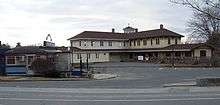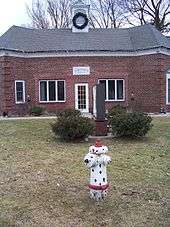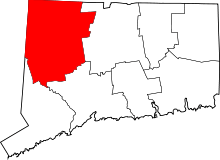Canaan (village), Connecticut
- Not to be confused with the town of Canaan, Connecticut.
|
Canaan Village Historic District | |
|
Main Street | |
  | |
| Location | Roughly bounded by W. Main, Bragg & Orchard Sts. & Granite Ave., North Canaan, Connecticut |
|---|---|
| Coordinates | 42°1′44″N 73°19′52″W / 42.02889°N 73.33111°WCoordinates: 42°1′44″N 73°19′52″W / 42.02889°N 73.33111°W |
| Built | 1872 |
| Architect | Lorrain,E.R. |
| Architectural style | Colonial Revival, Queen Anne, Vernacular Picturesque |
| NRHP Reference # | [1] |
| Added to NRHP | December 13, 1990 |
Canaan is a village and census-designated place (CDP) within the town of North Canaan in Litchfield County, Connecticut. Formerly known as Canaan Depot, the village is more commonly known as Canaan Village to distinguish it from the Town of Canaan located to the south of North Canaan. The Canaan Village Historic District is listed on the National Register of Historic Places. As of the 2010 census, the CDP had a total population of 1,212.
The historic district comprises about 93 acres (380,000 m2), covering the central business district and surrounding residences of the village that preserve the period from the mid-19th to early 20th centuries, when Canaan village was a regional commercial center. The district includes the Canaan Union Depot.[2]


The Canaan Fire Company was established in 1911.
Geography
According to the United States Census Bureau, the CDP has a total area of 4.5 km² (1.7 mi²). None of the area is covered with water.
Demographics
As of the census[3] of 2000, there were 1,288 people, 597 households, and 337 families residing in the CDP. The population density was 289.1/km² (750.6/mi²). There were 622 housing units at an average density of 139.6/km² (362.5/mi²). The racial makeup of the CDP was 95.96% White, 1.48% Black or African American, 0.16% Native American, 0.39% Asian, 0.00% Pacific Islander, 0.78% from other races, and 1.24% from two or more races. 4.11% of the population were Hispanic or Latino of any race.
There were 597 households out of which 27.3% had children under the age of 18 living with them, 40.5% were married couples living together, 12.7% had a female householder with no husband present, and 43.4% were non-families. 38.7% of all households were made up of individuals and 19.1% had someone living alone who was 65 years of age or older. The average household size was 2.16 and the average family size was 2.89.
In the CDP the population was spread out with 22.5% under the age of 18, 7.3% from 18 to 24, 28.3% from 25 to 44, 21.8% from 45 to 64, and 20.0% who were 65 years of age or older. The median age was 40 years. For every 100 females there were 87.8 males. For every 100 females age 18 and over, there were 81.5 males.
The median income for a household in the CDP was $30,438, and the median income for a family was $44,000. Males had a median income of $31,861 versus $23,375 for females. The per capita income for the CDP was $18,816. 6.7% of the population and 5.2% of families were below the poverty line. 3.5% of those under the age of 18 and 6.2% of those 65 and older were living below the poverty line.
See also
References
- ↑ National Park Service (2009-03-13). "National Register Information System". National Register of Historic Places. National Park Service.
- ↑ Mary E. McCahon (March 1990). "National Register of Historic Places Inventory-Nomination: Canaan Village Historic District" (PDF). National Park Service.
- ↑ "American FactFinder". United States Census Bureau. Archived from the original on 2013-09-11. Retrieved 2008-01-31.

